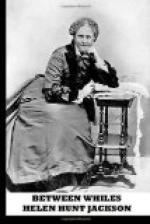“This is another breed, even if his father begot him,” replied Victor. “He goeth no such way as that.” And thoroughly disquieted, Victor returned to the house to report to Jeanne what Benoit had seen. She was still undisturbed.
“Thou wilt see,” was her only reply; and the two sat down together in the porch to await the lovers’ return. Hour after hour passed; even Jeanne began to grow alarmed. It was long after midnight.
“I fear some accident hath befallen them,” she said at last. “Would it be well, thinkest thou, to go in search of them?”
“Not a step!” cried Victor. “He took her away, and he must needs bring her back. We await them here. He shall see whether he may tamper with the granddaughter of Victor Dubois.”
“Hush, father!” said Jeanne, “here they come.”
Walking very slowly, arm in arm, came Willan and Victorine. They had evidently no purpose of entering the house clandestinely, but were approaching the front door.
“Hoity, toity!” muttered Victor; “he thinks he can lord it over us, surely.”
“Be quiet, father!” entreated Jeanne. Her quick eye saw something new in the bearing of both Willan and Victorine. But Victor was not to be quieted. With an angry oath, he sprung forward from the porch, and began to upbraid Willan in no measured tones.
Willan lifted his right hand authoritatively. “Wait!” he said. “Do not say what thou wilt repent, Victor Dubois. Thy granddaughter hath promised to be my wife.”
So the new generation avenged the old; and Willan Blaycke, in the prime of his cultured and fastidious manhood, fell victim to a spell less coarsely woven but no less demoralizing than that which had imbittered the last years of his father’s life.
[Footnote: Note.—“The Inn of the Golden Pear” includes three chapters of a longer story entitled “Elspeth Pynevor,”—a story of such remarkable vigor and promise, and planned on such noble and powerful lines as to deepen regret that its author’s death left it but half finished. A single sentence has been added by another hand to round the episode of Willan Blaycke’s infatuation to conclusion.]
The Mystery of Wilhelm Ruetter.
It was long past dusk of an August evening. Farmer Weitbreck stood leaning on the big gate of his barnyard, looking first up and then down the road. He was chewing a straw, and his face wore an expression of deep perplexity. These were troublous times in Lancaster County. Never before had the farmers been so put to it for farm service; harvest-time had come, and instead of the stream of laborers seeking employment, which usually at this season set in as regularly as river freshets in spring, it was this year almost impossible to hire any one.
The explanation of this nobody knew or could divine; but the fact was indisputable, and the farmers were in dismay,—nobody more so than Farmer Weitbreck, who had miles of bottom-lands, in grain of one sort and another, all yellow and nodding, and ready for the sickle, and nobody but himself and his son John to swing scythe, sickle, or flail on the place.




